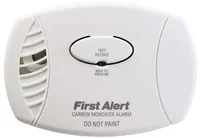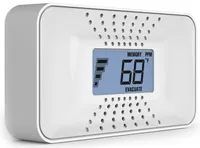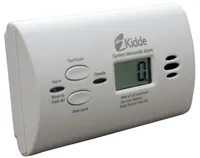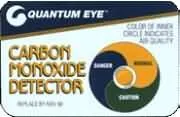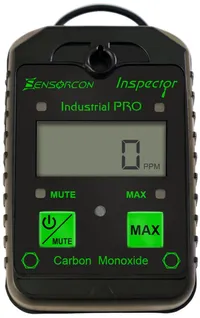How to Tell If Your Ford Explorer Is Leaking Carbon Monoxide
Make sure your vehicle is safe from carbon monoxide by using one of these battery-powered detectors or ones specifically designed for cars.
The Ford Explorer has a troubling problem: The popular sport utility vehicle (SUV) might be causing carbon monoxide to leak into the vehicle, putting people at risk of poisoning.

According to a broad CBS News investigation, 1.3 million owners of Ford Explorer model years 2011 through 2017 have received word from Ford that their vehicles are affected.The report says that the National Highway Traffic Safety Administration (NHTSA) is investigating what is causing carbon monoxide from the Explorer's exhaust to seep into the passenger cabin. While NHTSA hasn't found evidence of actual carbon monoxide poisoning, Ford has acknowledged that it has received up to 2,000 complaints from owners.
In a letter to customers, Ford has said that although carbon monoxide is indeed seeping into cars, the amount is "safe".
Still, the automaker is offering a voluntary repair program that will reprogram the air conditioner, replace drain valves and ensure the cabin is properly sealed. An exact cause of the seeping is still unknown.
So we've compiled the following quick-access guide to help you determine if your Ford Explorer, or any vehicle, has a carbon monoxide problem.
Carbon monoxide alarms
Believe it or not, many of the carbon monoxide alarms you use in the home are just as useful in the car.
Most carbon monoxide alarms sold today are small enough to fit in your vehicle and are sensitive enough to recognize the gas and alert you to its presence. The alarm might be a little loud in your car, of course, but it's always good to know when you're at risk.
Get instant access to breaking news, the hottest reviews, great deals and helpful tips.
But before you pick just any alarm, keep in mind that if you're using it in your vehicle, you'll need a mobile, battery-powered device or one that comes with a car adapter for plugging into your vehicle.
Here are a handful of good options that will keep you safe on a drive.
First Alert CO511B
First Alert's CO511B is a handy option that comes with both a loud alarm and a vocal alarm. It costs just $40 on Amazon and is battery-powered, so you can place it in your car and let it sit there.
First Alert CO511B
Wewalab CO Detector
The Wewalab CO Detector is another battery-powered option if you don't want to spend too much cash on a detector. The device, which costs just $17, can sound an alert within 3 minutes of registering a 300-parts-per-million reading. Anything over 70 parts per million is considered unsafe.
Wewalab CO Detect
First Alert CO400
If it's a cheaper carbon monoxide alarm you're after, consider the First Alert CO400. The battery-powered alarm costs just $17, and like the others, will alert you when the battery is running low.
First Alert CO400
First Alert CO710
The $36 First Alert CO710 is a carbon monoxide alarm that promises a whopping 10 years of battery life. It also comes with a digital temperature display that tells you how hot or cold it is outside.
First Alert CO710
Kidde Carbon Monoxide Alarm
If you're looking for the cheapest way to get a carbon monoxide alarm in your car, go with the Kidde. The battery-powered alarm is available in a two-pack for just $4 on Amazon. It only takes two AA batteries to get your reading.
Kidde Carbon Monoxide Alarm
Car-Only Alarms
If you're looking for devices that work solely for the car, here are a couple of options:
Quantum Eye Multi-Level Carbon Monoxide Detector
The Quantum Eye Multi-Level Carbon Monoxide Detector is well suited to a variety of vehicles, including cars, airplanes and others. The sensor can last up to 18 months before it needs to be replaced and can tell you within minutes whether you're in danger.
Quantum Eye Multi-Level Carbon Monoxide Detector
SevenPetal Carbon Monoxide Mointor
The SevenPetal Carbon Monoxide Monitor is a digital, programmable device that will set you back a whopping $179. For that, you'll get a rugged device that's both waterproof and dustproof and provides real-time analysis of parts per million on its built-in LCD. You can also set two alarm points to identify when the alarm should sound.
SevenPetal Carbon Monoxide Monitor
Don Reisinger is CEO and founder of D2 Tech Agency. A communications strategist, consultant, and copywriter, Don has also written for many leading technology and business publications including CNET, Fortune Magazine, The New York Times, Forbes, Computerworld, Digital Trends, TechCrunch and Slashgear. He has also written for Tom's Guide for many years, contributing hundreds of articles on everything from phones to games to streaming and smart home.
-
carbonmonoxideforensics Home detectors are not good for CO as temperatures in the car are too high.Reply
Just launched new product CO detector for car, specifically designed and alarms at low CO levels 9ppm in line with EPA and WHO recommendations.
https://www.amazon.com/dp/B076S6KBP2
 Club Benefits
Club Benefits







